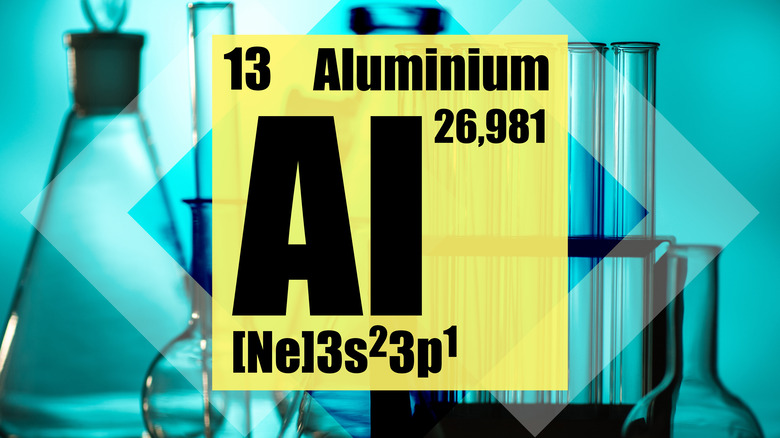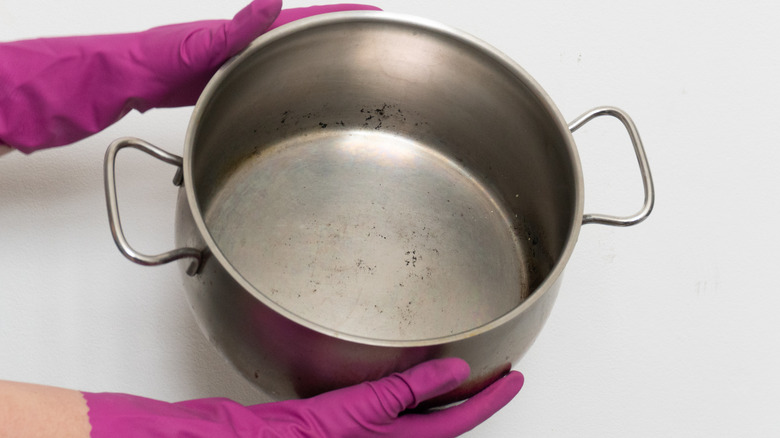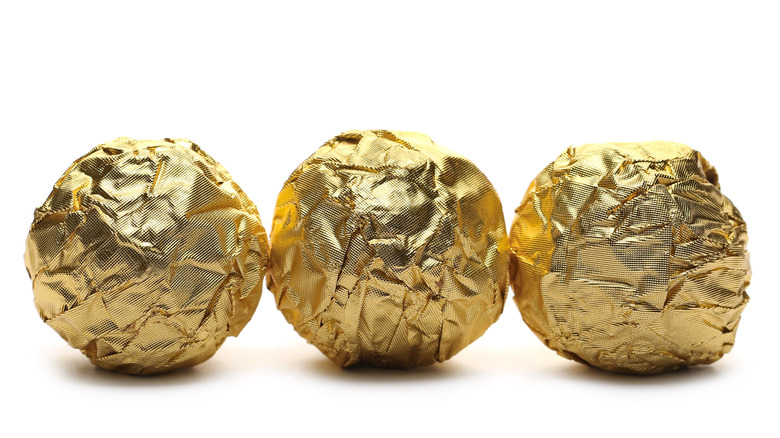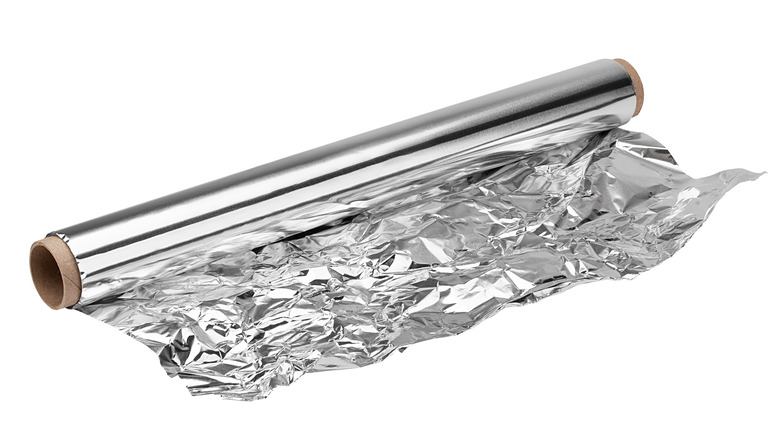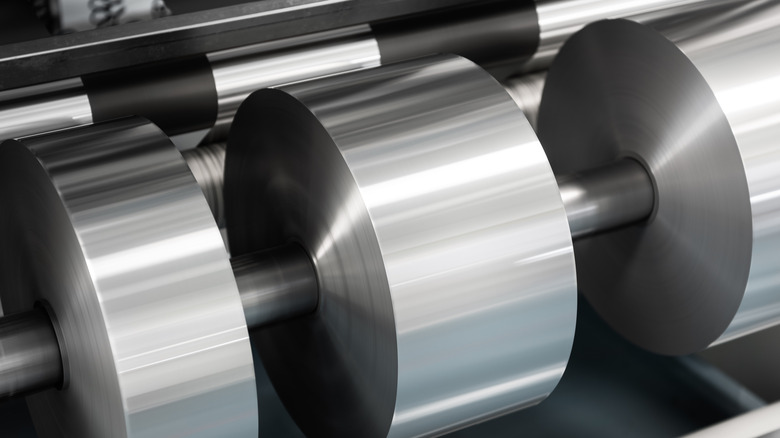Why You Should Be Using Aluminum Foil To Remove Rust From Metal
Aluminum foil is a must-have in every household. Even Merry Maids agree with us on that. From wrapping sandwiches to baking hot pasta, aluminum serves different functions when it comes to food. But who would have thought it could be used to save you from all the arm effort in scrubbing off rusts.
As baffling as it is, aluminum foil is an inexpensive, simple, and stress-free way to remove rust because it chemically dissolves iron oxides by attracting oxygen molecules to itself. This makes it a better option to physically removing rust with scouring powder and steel wools. Aluminum foil combined with salt water or vinegar will have your pot rust-free before you say Jack Robinson! (via Science ABC).
Now, with so many weird life hacks, tips, nuggets, and Tiktok challenges circulating the internet, it can be hard to know the truth about what aluminum foil does for you. That's why we at House Digest have created this unbiased review about why you should be using aluminum foil to remove rust from metal.
Aluminum is scientifically proven to work wonders on rust
Before we go into the benefits of aluminum, how in the world does aluminum foil remove rust? According to the BBC, when iron reacts with oxygen and water, it forms a brownish coarse surface -– this is called rust, AKA hydrated(III) oxide. Rust, in simple terms, is oxidized metal. So the goal in removing it is to un-oxidize the iron in question.
Bluntly, we are going to break the chemical romance between oxygen and iron –- and although we may (a lot of times) default to physically breaking them apart by scrubbing, My Fix it Up Life suggests an even smarter way; why don't we fight equally with another chemical reaction, by swaying oxygen with a more attractive substance. A substance like aluminum.
Oxygen has a greater affinity for aluminum, so when iron oxides rub against aluminum, it loses oxygen to it. Vinegar is like aluminum's cologne to quicken the process. It dissolves iron oxides as well, but the reaction halts after it becomes saturated with oxygen (via Science ABC).
Aluminum offers better after-result than its alternatives
The best way to discover the benefits of using aluminum to remove rust is to A/B-test it with common rust removers like steel wools and mild acids. What makes aluminum way better is the final results after being used. While steel scrubs leave a decent amount of scratches on your metal, aluminum leaves fewer marks, if any at all, because it is softer than steel and most metals, per SBG Sword Buyers Guide. It chemically dissolves rust instead of scrubbing as well. That's why Oxygen swiped right immediately.
Using mild acids like Diet Coke to remove rust reduces the durability and strength of the metal. Steel wool leaves it dull and unpolished, while aluminum produces a fine polishing compound, per Slippery Rock Gazette, during the process of removing rust, that when combined with water, leaves your metal (mostly chrome) shiny, smooth, and polished.
Aluminum is long-lasting and durable
Another major benefit of using aluminum foil over steel is its durability. Even though steel wool is used to scrub off rust, the substance itself rusts when exposed to water, oxygen, and soil. According to Thyssenkrupp, rust is a specific type of corrosion that only affects steel and iron. So steel wool weakens in humid conditions and becomes useless overtime when the rust eats into the steel.
Yes, aluminum corrodes as well but does not rust. Metals Warehouse proves this fact further. A positive thing about aluminum corrosion is that because oxygen and aluminum love each other so much, aluminum, when exposed to air, water, or soil, forms aluminum oxide. It looks like a whitish skin, and it coats the surface of the aluminum. Unlike rust, this whitish coating hardens and doesn't flake. It protects the metal from corrosion until the coating is washed or scraped off, then, your aluminum is good as new, and this reaction begins again (via Wiley Metal). This makes aluminum a longer-lasting alternative.
Aluminum is easier to use
Aluminum foil is better than other alternatives in terms of its level of effectiveness as well. This is what we mean; Using Steel wool is going to take a serious level of elbow grease because you are fighting a chemical reaction (rust) with physical effort (scrubbing), says Slippery Rock Gazette.
Removing rust with aluminum, on the other hand, is a breeze. Even Ella Claire & Co. agrees that it's super easy to use. Sometimes when iron oxide (rust) is left on metal for too long, it eats deeper and deeper into the metal to form rusted pits. It's difficult to fit a ball of steel wool into them, talkless of scrubbing them off, but with aluminum foil, you don't have to struggle with digging rusted pits on the surface of the metal; you can just glide it across the pit surfaces to remove the rust, per Slippery Rock Gazette.
Aluminium is versatile and safer to use
If you love your cooking pans as much as you love your kitchen, you definitely can't stand the sight of someone scrubbing at one of those cooking darlings. It's an unspoken rule in the kitchen world, but why can't I use steel wool on stainless pans? Well, when you use steel wool to scrub stainless pans, it scrubs off its metal finish with it. This makes it even more vulnerable to rust corruption. The Kitchn also says that broken bits from the steel can remain on the pan and rust.
Aluminum foil, on the other hand, is versatile and can be used to remove rust on several types of metal, including stainless steel. According to Britannica, pure aluminum is one-third as dense as iron, and despite its light-weight, it is ductile, flexible, and serves a lot of functions. It is also safer to use than steel wool. The Kitchn advises steel wool users to wear gloves whenever they want to work with it. Its broken parts can get stuck in your nails or give you splinters and cuts, which can get infected, or you could enjoy the splinter and cut-free use of smooth aluminum foil.

